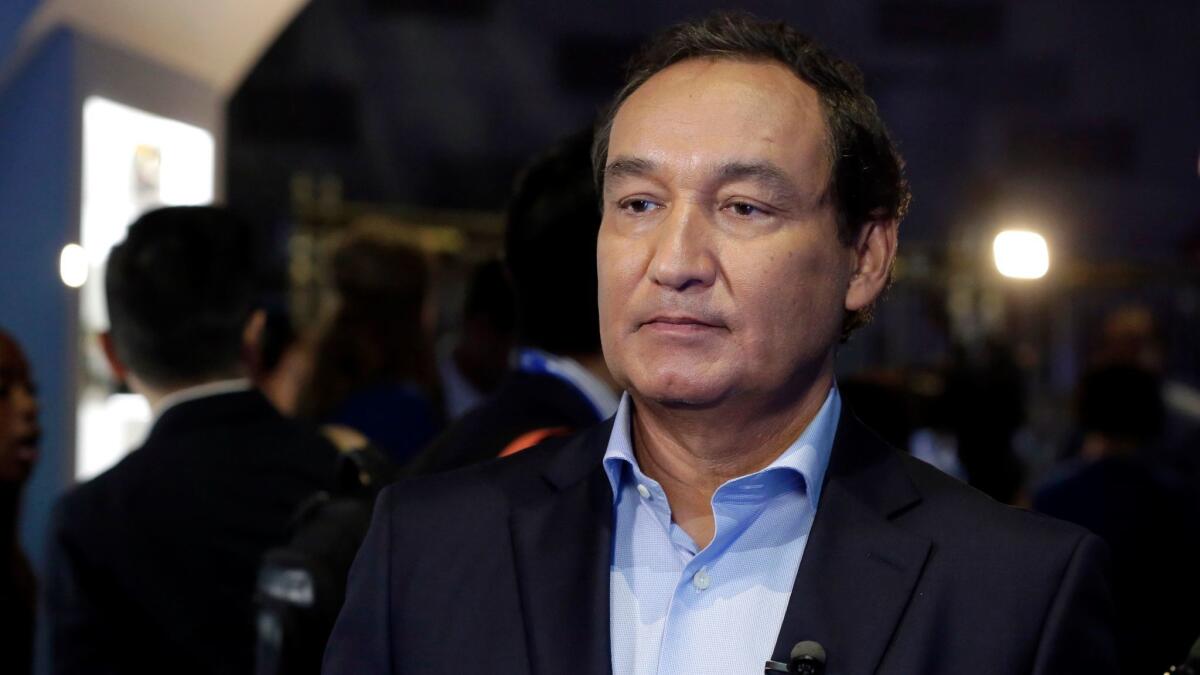United CEO Oscar Munoz: From ‘Communicator of the Year’ to PR disaster

- Share via
Not quite a full month ago, before #LeggingsGate and dragging-gate and the accompanying public scorn, United Airlines Chief Executive Oscar Munoz put on a bow tie and ascended a stage in New York for the self-styled “Oscars of the PR world.”
Munoz had just been named PRWeek’s “Communicator of the Year,” an honor he shared with gay rights pioneer Edie Windsor and Malala Yousafzai, a young Pakistani activist who survived being shot in the head by the Taliban for championing women’s rights.
Munoz had not done anything like that. But he had, PRWeek explained, rehabilitated the image of an airline once tangled in multiple image crises — unpopular with employees and customers alike.
“Communication and communication strategy is not just part of the game, it is the game,” Munoz said as he accepted PRWeek’s award.
On Tuesday — just before Munoz issued United’s fourth attempt at a response to an incident in which a passenger was violently dragged off a plane so a crew member could take his seat — PRWeek’s editor in chief wrote a scathing assessment of the honoree’s subsequent performance.
“If PRWeek was choosing its Communicator of the Year now, we would not be awarding it to Oscar Munoz,” Steve Barrett wrote. “In time, the episode and subsequent response will be quoted in textbooks as an example of how not to respond in a crisis.”
Four weeks earlier, the 18-year-old industry magazine had glowingly profiled Munoz, his golden tongue and his accomplishments since taking over United amid a leadership scandal in late 2015.
A month into the job, Munoz had a heart attack.
And yet, before and after an extended hospital stay, he built a reputation as an open, communicative chief executive.
“Oscar Munoz has started his tenure with an apology,” Fortune wrote, citing an email he sent to frequent fliers promising “we can do better.”
By March, as PRWeek named him “Communicator of the Year,” the magazine had a long list of his accomplishments to cite.
Munoz had signed new contracts with once-intractable employee unions. He had hired United’s “first chief storyteller.”
And he’d invited Fortune to follow him around, resulting in a profile in which he sounded nothing like the stereotypical corporate CEO.
“We didn’t have nine brands of cereal at home,” he told the magazine, recalling his childhood, before he began climbing through the ranks of corporate behemoths such as Pepsi, Coca-Cola and AT&T. “We’d line up to fill our bowls from a giant vat of oatmeal.”
His “blue-collar” roots, PRWeek wrote, had helped Munoz win over “disgruntled staff” among United’s tens of thousands of employees.
That, in turn, helped diminish customer service complaints that had dogged the airline’s previous leader.
That, in turn, raised the stock price.
“His staff clearly love him,” Barrett, PRWeek’s editor, said in a podcast the morning after Munoz accepted the award. “It’s great to see a CEO actually believing in communications and saying it leads his whole company.”
That was March 17.
Nine days later, a United Airlines gate agent stopped two girls in leggings from boarding a plane — initiating a public relations crisis when a passenger tweeted about it and United quickly responded that it had the “right to refuse passengers who are not properly clothed.”
Hours later, after thousands had joined in the outrage, the company clarified that the girls had been traveling on a company pass.
“To our regular customer, your leggings are welcome,” United wrote.
But the communication experts at PRWeek were concerned that United’s “initial reaction caused the situation to blow up into an international news story.”
The magazine’s write-up didn’t call out Munoz, but it did get a United executive to admit that the airline “made a mistake.”
That furor passed. Planes continued to fly. But two Sundays after the leggings incident, United found itself facing a PR catastrophe on a whole other level.
In Tuesday’s article, Barrett lambasted United’s “tone-deaf communications response” to viral videos of a man being yanked from his seat by security, battered against an arm rest and dragged off the plane after he refused to give up his seat to an off-duty United employee.
“This is an upsetting event to all of us here at United,” Munoz’s statement read in part. “I apologize for having to re-accommodate these customers.”
“The term ‘re-accommodate’ smacked of legalese aimed at avoiding future litigation,” Barrett wrote, as the term inspired a storm of memes online, “rather than responding to what was a horrific video of a disturbing incident.”
After adding an enormous asterisk to Munoz’s award, the editor concluded his article with one thing the CEO had not yet done. Barrett offered sympathy to “the victim in this case, who was clearly — and understandably — extremely shaken up by his forcible removal from the plane.”
A few hours later, Munoz released a mea culpa doing just that.
He said much the same thing on “Good Morning America” the next day.
But by then it had taken the Communicator of the Year — who began his leadership of United with a public apology and praise — nearly two days to say sorry for what communications experts across the country are calling one of the worst PR catastrophes in recent memory.
Avi Selk writes for the Washington Post.
More to Read
Inside the business of entertainment
The Wide Shot brings you news, analysis and insights on everything from streaming wars to production — and what it all means for the future.
You may occasionally receive promotional content from the Los Angeles Times.










